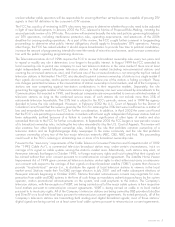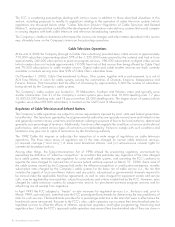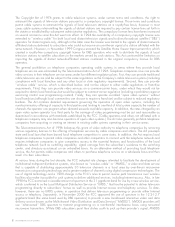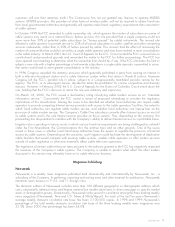Washington Post 2002 Annual Report Download - page 16
Download and view the complete annual report
Please find page 16 of the 2002 Washington Post annual report below. You can navigate through the pages in the report by either clicking on the pages listed below, or by using the keyword search tool below to find specific information within the annual report.Title IV eligibility in the future or that the Department of Education might not successfully assert that one or more of such
schools have previously failed to comply with Title IV requirements. Most schools within Kaplan’s Higher Education Division
are considered separately for the purpose of determining compliance with Title IV requirements. Thus if the Department of
Education were to find that one or more of such schools had failed to comply with any applicable Title IV requirement and as
a result suspended or terminated the Title IV eligibility of those schools, that action normally would not affect the Title IV
eligibility of other Kaplan schools that had continued to comply with Title IV requirements.
As a general matter, schools participating in Title IV programs are not financially responsible for the failure of their
students to repay Title IV loans. However the Department of Education may fine a school for a failure to comply with
Title IV requirements and may require a school to repay Title IV program funds if it finds that such funds have been
improperly disbursed. In addition, there may be other legal theories under which a school could be subject to suit as
a result of alleged irregularities in the administration of student financial aid.
Pursuant to Title IV program regulations, a school that undergoes a change in control must be reviewed and
recertified by the Department of Education. Certifications obtained following a change in control are granted on a
provisional basis which permits the school to continue participating in Title IV programs but provides fewer procedu-
ral protections if the Department of Education asserts a material violation of Title IV requirements. As a result of
Kaplan’s acquisition of Quest Education Corporation in 2000, all of the schools owned by Quest at that time were
provisionally certified by the Department of Education for a term expiring in June 2004; Kaplan will be eligible to
apply for full certification for such schools (which constitute most of the schools in Kaplan’s Higher Educational
Division) in the spring of 2004. The schools acquired by Kaplan’s Higher Education Division subsequent to the Quest
acquisition have also been provisionally certified by the Department of Education, generally for terms expiring
approximately three years after the date of the acquisition.
Several Title IV programs are subject to periodic legislative review and reauthorization, and the next reauthorization
is scheduled to take place during the current Congressional term. In addition, the availability of funding for each
Title IV program is wholly contingent upon the outcome of the annual federal appropriations process.
Whether as a result of changes in the laws and regulations governing Title IV programs, a reduction in Title IV
program funding levels, or a failure of schools included in Kaplan’s Higher Education Division to maintain eligibility
to participate in Title IV programs, a material reduction in the amount of Title IV financial assistance available to the
students of these schools would have a significant negative impact on Kaplan’s operating results.
Other Activities
International Herald Tribune
On January 1, 2003, the Company sold its 50% beneficial interest in the Paris-based International Herald Tribune to
The New York Times Company.
BrassRing
The Company beneficially owns a 49.4% equity interest in BrassRing LLC, an Internet-based career-assistance and
hiring management company. The other principal members of BrassRing are the Tribune Company with a 26.9%
interest, Gannett Co., Inc. with a 12.4% interest, and the venture capital firm Accel Partners with a 10.5% interest.
Production and Raw Materials
The Washington Post is produced at the Company’s printing plants in Fairfax County, Virginia and Prince George’s
County, Maryland. The Herald and The Enterprise Newspapers are produced at The Daily Herald Company’s plant
in Everett, Washington, while The Gazette Newspapers and the Southern Maryland Newspapers are all printed at
the commercial printing facilities owned by Post-Newsweek Media, Inc. Greater Washington Publishing’s periodi-
cals are produced by independent contract printers with the exception of one periodical which is printed at one of
the commercial printing facilities owned by Post-Newsweek Media, Inc. All PostNewsweek Tech Media publications
are produced by independent contract printers.
Newsweek’s domestic edition is produced by three independent contract printers at five separate plants in the United
States; advertising inserts and photo-offset films for the domestic edition are also produced by independent contrac-
14 THE WASHINGTON POST COMPANY
























